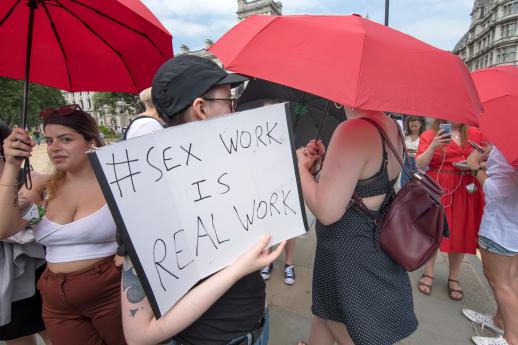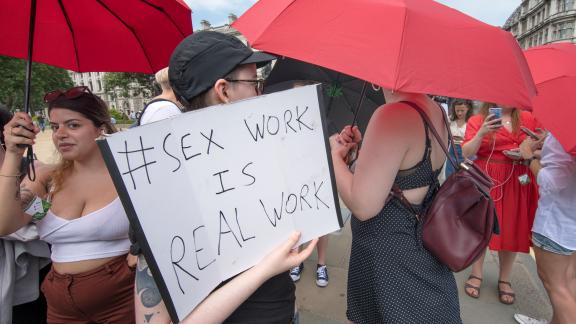Sex Work Decriminalization in Belgium
What is criminalization?
What we called “criminalization” referred to the fact that all third-party services needed by a sex worker (SW) to perform their work were considered criminal. In other words, they were deemed to be acts of pimping. Legislators made no distinction between human trafficking and sex work, assuming that any professional working with a sex worker was coercing them. Furthermore, the consent of sex workers was presumed non-existent ("the person’s consent is irrelevant"). All sex workers were considered victims to be protected, and anyone associated with them was labeled a pimp guilty of exploiting them. This logic meant that providing a workplace for a sex worker, working as their accountant, creating their website, giving advice, opening a bank account for them, hiring them, or offering them taxi services within the scope of their work were all considered acts of pimping.
What is decriminalization in Belgium?
It is particularly noteworthy that the decriminalization of sex work was carried out as part of a broader reform of the sexual criminal code. The previous code, dating back to 1867, was outdated, notably because sexual offenses were not treated as violations against individuals but as offenses against public morality and family order. Additionally, sexual offenses and notions of rape were poorly defined.
The new criminal code aimed to place the notion of consent at its center, better delineate sexual offenses against individuals, and impose harsher punishments. It is within this context—of better defining consent and its absence (explicit or coerced) in the general realm of sexuality—that the capacity of sex workers to consent in a work context was introduced.
What changes and opens up? The reform differentiates between the concepts of pimps and third parties within the professional sector. It recognizes consent and the withdrawal of consent for sex workers. Decriminalization is not the end or culmination of a process but the beginning. It is the sine qua non condition to effectively combat the discrimination sex workers face in all areas of professional and personal life. It also lays the groundwork for broader societal change in the perception of sex work and sex workers.
when
country
Belgium
region
European Network
Subject
Sex Workers

Decriminalization is not the end or culmination of a process but the beginning. It is the sine qua non condition to effectively combat the discrimination sex workers face in all areas of professional and personal life.

A transformative Law for Sex Workers rights
Following decriminalization, the government chose, under the impulse of the national sex workers' organisation, to create a legal labour framework for sex work. This was necessary to distinguish situations of pimping (coercion of a third party into sex work) from those of employment with an employer. The aim was to establish legal obligations for employers to ensure the well-being and safety and sexual integrity of their employees. This goal was achieved with the labor framework passed in May 2024, which took effect on December 1.
A Labor Framework Adapted to Sex Work
Sex work requires the same protections as other types of work, such as access to the general social security system (maternity and sick leave, unemployment benefits, and pension contributions). However, it is also a specific type of work requiring particular attention. Five sexual freedoms for sex workers within the scope of their work have been established to ensure that the labor framework and its logic of hierarchy do not conflict with the criminal code's absolute protection of sexual consent.
Sex workers are guaranteed the following rights:
- The right to refuse a client.
- The right to refuse a sexual act.
- The right to interrupt a sexual act at any time.
- The right to perform a sexual act in the manner they choose.
- The right to refuse to advertise their services.
Exercising any of these rights cannot be considered a breach of the employment contract by the sex worker. If a sex worker invokes one of these rights, they are protected from dismissal or any other adverse measures by the employer. If a sex worker exercises their right to refusal more than 10 times within six months, either the worker or the employer can request mediation through the government service for well-being at work. This service will evaluate whether there is an issue with working conditions or the employer-employee relationship and may propose alternative career options.
Additionally, under the prohibition on preventing a sex worker from leaving the profession (as guaranteed by the criminal code), the labor framework allows sex workers to terminate their contracts at any time without penalties or notice periods. If they voluntarily end their contract, they do not lose their entitlement to unemployment benefits.
Protections and Safety Standards
A labor framework offers better protection against exploitation by giving workers tools to take action against unethical employers or workplace exploitation. Employers must obtain governmental approval to hire workers, and it is prohibited for anyone previously convicted of exploitation, physical assault, or sexual offenses to be granted this approval. Any subordinate work arrangements or organized work outside this framework are considered pimping.
In addition, employers must comply with the following safety measures:
- During sexual services, a reference person (internal or external) must always be available to ensure that the work is conducted safely.
- Each room where sexual services are provided must be equipped with an alarm button. If services occur outside the establishment, the employer must provide a mobile alarm button linked to the reference person.
- Unions, support organizations for sex workers, and professional sex worker organizations must have access to the workplace at any time. Sex workers are not obliged to accept offers from these organizations.

Sex work requires the same protections as other types of work
Shutterstock/Koca VehbiLimits & points of attention
Rarefaction of Workspaces
Sex workspaces that allow for contractual labor are few and far between and tend to become stagnant. Municipal authorities often aim to limit or prevent the establishment of new sex workspaces, citing urban saturation, real estate speculation, or stigma against such activities as detrimental to neighborhoods.
For the labor framework to fulfill its potential, it must coexist harmoniously with third-party professional sectors and political institutions. This requires supporting the establishment of sex workspaces rather than systematically obstructing them. Professional insurance services, commercial property insurance, and banking services must be accessible to new sex work projects.
Undocumented Sex Workers
As with the broader labor market, the contractual sex worker status is only accessible to those eligible (e.g., EU citizens). Non-EU nationals without legal residence permits cannot benefit from this framework, leaving the most vulnerable sex workers without the means of protection that are granted with the new labour law.
However, the new status offers improved protection even in cases of undeclared sex work in a hierarchical relation. Employers are legally obligated to pay the minimal salary owed to workers, even in cases of undocumented or informal work. In cases of proven exploitation, this allows workers to file for compensations of their wages had been withheld, regardless residency status.
Grey Area and Informal Economy
The new regulations aim to provide sex workers with comprehensive social protection and to exclude dishonest managers or exploiters. However, the clarity of the new regulations could also be used to reduce or eliminate sex work. Some municipalities are already hiding behind terms like “safety” and “hygiene” to pass highly restrictive local regulations that make sex work almost impossible within their territories.
Furthermore, how will sex workers without status or legal residence be treated in the future? This remains unclear, as it has not yet been decided how the new law will be enforced. UTSOPI is already in talks with experts, social inspectors, and local councils to influence the upcoming policy. Decriminalization and access to a protective labor framework for some sex workers must not turn into a tool of harm and discrimination against those who do not fall within this framework or cannot benefit from it. This means that arguments about cracking down on undeclared work must not lead to a crackdown on sex workers.
Sex work is, and will remain, a unique economy. For part of the community, it represents a professional dynamic, while for another group, it is a temporary survival economy. A significant portion of the sector operates with extremely low prices, in precarious and insecure conditions. As such, we call on authorities to approach the issue of undeclared sex work from the perspective of care and risk reduction especially when the individuals involved need help and support. The imperative to provide help must outweigh the imperative to prosecute. Regardless of whether sex work is conducted within a legal framework, sex workers must be able to work safely.
A major step for sex workers autonomy and labor rights
Due to the lack of proof of income, sex workers are hindered in basic aspects of life, such as accessing housing or banking services. Until 1 December, only self-employed work was a possibility, which is a status that can be precarious, offers little protection, and involves a heavy administrative and accounting workload that can be burdensome and stressful.
Furthermore, the new status opens up better social protections and practical tools to combat incorrect or exploitative work situations. Recognizing sex work as legitimate labor allow issues or disputes to be brought before the labor auditor if necessary. In practical terms, this will clarify the distinction between self-employed and employee statuses and raise awareness of this distinction in the sector. For instance: in places where sex workers are officially self-employed, efforts must be made to combat practices that impose de facto subordination (e.g., managers setting rates or working schedules). Conversely, in places where sex workers are employees, the guaranteed minimum wage must be enforced, even during periods of reduced activity. Thus, this new employee status offers a positive perspective for integrating sex work into the broader labor framework.
Self-Managed Spaces and Cooperatives: Legally, it is now possible to create sex worker cooperatives managed by the workers themselves. Although such cooperatives do not yet officially exist, this option would provide greater empowerment for sex workers, as they would own means of production.

This new employee status offers a positive perspective for integrating sex work into the broader labor framework.
AndriiKoval/ShutterstockCall to action and new perspectives
To enable a real and fair application of the labor framework for sex workers, we call on the Belgian authorities to complete this new legislative framework with the following provisions:
- Develop and encourage the opening of new sex work spaces, managed and designed by the workers themselves
- Facilitate access to residence permits and the legal labor market for undocumented sex workers
- Apply tolerance for sex workers who are neither under employment contract nor self-employed
- Prioritize the safety and well-being needs of sex workers over that of hunting down undocumented immigrants or tax fraud
- Stop local regulations issued by municipalities on sex workers, which hinder and overtax the activity
Banner image: Shutterstock/Koca Vehbi










